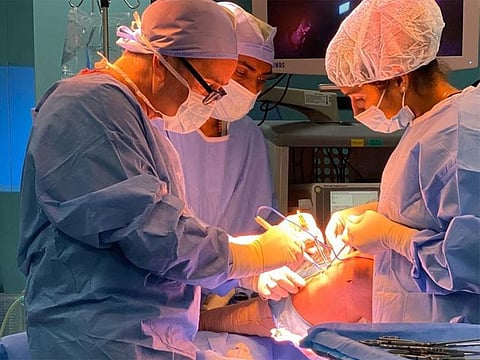UAE athlete undergoes regional-first meniscus transplant
Tissue sized up and flown in from US to complete groundbreaking procedure

Dubai: A regional first meniscus allograft transplant, for the knee cartilage separating the thigh and shin bone, has been carried out Dr Phillipe Landreau on a well-known former UAE athlete.
The graft was implanted through an arthroscopic procedure at Al Garhoud Hospital on Tuesday using cadaver tissue flown in from the US.

“Unlike the other structures of the knee such as the Anterior Cruciate Ligament (ACL) which is commonly injured, the meniscus has to be of a specific shape and size,” said Dr. Landreau. “ACLs are usually repaired using tissue from the patient’s own body as no sizing up is required, but in the case of the meniscus there is no autograft, so it is either repaired or in cases where someone has suffered an irreparable lesion, a donor tissue is required of the exact shape and size for it to be reconstructed.”
In this case, prior to the procedure, the patient was suffering from persistent pain as he was left with no lateral meniscus after total lateral meniscectomy (meniscus removal). He underwent several alternative treatments, including physical therapy and injections, yet the knee pain continued to impact his daily life.
“Being an important knee structure, which protects and cushions the joint surface and bone ends, the absence of meniscus leads to cartilage damage. And without any effective medical intervention, it could lead to osteoarthritis requiring knee arthroplasty,” said Dr Landreau.
“The only solution to preserve the knee at this stage was an meniscus allograft transplant using a frozen meniscus from a donor bank. Accurate size matching between the donor and recipient meniscus is the key to the successful outcome of the surgery. A radiographic method was used to measure and match the width and length of the menisci and so a wait of several weeks was required to find the perfect donor,” he added.
This transplant has opened up the doors for many other patients suffering from severe meniscus tears where the tissue cannot be redeemed. Previously they would have had to fly to Europe or the US for such surgery.
Since the meniscus tissue transplanted has no blood or major vessel and is basically a frozen tissue, it acts like a scaffold over which the recipient’s blood and vessels build and intergrate the tissue as his own in a matter of six months.
“Unlike the transplant of major organs such as the heart or kidneys this procedure does not require the patient to go on immunosupppresant drugs,” said Dr. Landreau.
The patient will however have to undergo intensive physiotherapy to integrate the tissue and strengthen his knee.
All major insurances will cover such transplants in the UAE, said the director of DxBone, Fawaz Hamie.
Dr. Landreau is the chief medical officer for DxBone, a centre of excellence for bone and joint care, which is soon to open in Dubai Design District.


